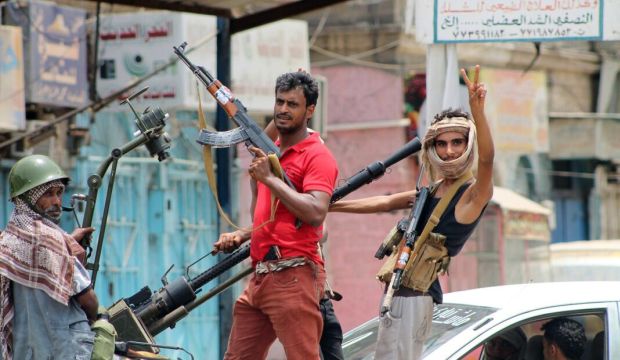Last week’s capture of Aden by Yemeni government loyalists has provided the best response to the nuclear deal which US President Barack Obama and the West gifted to Khomeneist Iran on July 14 in Vienna.
Anti-Houthi forces, known as the Popular Resistance, have wrested control of the strategic southern city of Aden, adopting a new strategy and depending on advanced military support from Arab coalition forces. Aden’s international airport and strategic districts have fallen into the hands of government loyalists and forces aligned with President Abd Rabbuh Mansur Hadi thanks to the coalition’s unfaltering support and perseverance.
Houthi militants and forces loyal to ex-president Ali Abdullah Saleh lost Aden at the same time Tehran’s Foreign Minister Mohammad Javad Zarif was flashing smiles at journalists in Vienna last week.
No wise person would object to the lifting of an economic blockade on any nation or state, let alone a Muslim and neighboring country such as Iran, which boasts a gifted population and a majestic past. One can object, however, to the way in which the West has approached the Iranian problem. The West has sealed the deal with Iran without realizing the existential threat which the ideology of its rulers poses to the Middle East. What would be even worse is if the West does indeed realize these threats but is “experimenting” with new policies in the region.
Lebanese political leader Walid Jumblatt announced the “end of the Arab world” following the nuclear deal in Vienna. But a Saudi official commented on the deal by saying that the Kingdom has always called for a nuclear deal with Iran that would ensure it cannot obtain nuclear weapons in any way. Saudi Arabia believes Iran should take advantage of its resources to achieve domestic development and improve the living conditions of its people instead of destabilizing the region, a policy which will be met with decisive responses from other regional countries.
John Boehner, the speaker of the US House of Representatives, said of the agreement: “Instead of stopping the spread of nuclear weapons in the Middle East, this deal is likely to fuel a nuclear arms race around the world.”
Arabs have no problem with the boring, technical remarks about uranium enrichment and centrifuges reiterated by Western officials. Nor do they object to Zarif’s smiles. In fact, the real problem lies in the nature of the mentality of Iran’s rulers and the money that will flood into the coffers of the Islamic Revolutionary Guard Corps, which will definitely cause more destruction and strife in our countries. The problem lies in the way the Iranian regime thinks. The following is a sample from the Iranian constitution:
The fifth paragraph of the second article stipulates “belief in the Imams (imamat), [its] continuous leadership, and its fundamental role in the continuity of the Islamic Revolution.” The sixteenth paragraph of the third article calls for “the organization of the nation’s foreign policy based on Islamic criteria, fraternal commitment to all Muslims, and unrestrained support for the impoverished people of the world.”
“Impoverished” in this context means followers of Iran. To put it more candidly, the constitutional article calls for funding and arming militias loyal to Iran within Arab and Muslim countries.
Arabs will fight for their countries. As for Washington and the European capitals, they will soon realize the consequences of their Iranian adventure.
